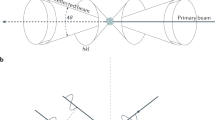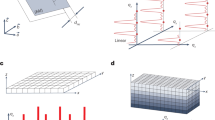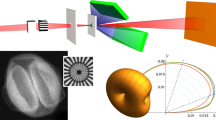Abstract
A METHOD of quickly making observations by X-ray diffraction is needed for investigation of unstable phases and of structural rearrangements in crystals : it is also desirable in order to expedite the orienting of normal specimens for crystallography. The required direct observation and rapid recording have now been achieved by use of electronic intensification of the image of the diffraction pattern. It has proved possible to correct approximate settings of the crystal by inspection, and transient diffraction patterns have been observed. Exposure times for photographic recording range between 0.5 sec and 5 sec.
This is a preview of subscription content, access via your institution
Access options
Subscribe to this journal
Receive 51 print issues and online access
$199.00 per year
only $3.90 per issue
Buy this article
- Purchase on Springer Link
- Instant access to full article PDF
Prices may be subject to local taxes which are calculated during checkout
Similar content being viewed by others
References
Teves, M. C., Philips Tech. Rev., 17, 69 (1955).
Kennedy, S. W., and Schultz, P. K., Trans. Faraday Soc., 59, 156 (1963).
Kennedy, S. W., Brit. J. App. Phys. (to be published).
Author information
Authors and Affiliations
Rights and permissions
About this article
Cite this article
KENNEDY, S. Rapid X-ray Diffraction Studies using Image Intensification. Nature 210, 936–937 (1966). https://doi.org/10.1038/210936a0
Issue Date:
DOI: https://doi.org/10.1038/210936a0
This article is cited by
-
Martensitic transformation cubic ? rhombohedral in rubidium nitrate
Journal of Materials Science (1976)
Comments
By submitting a comment you agree to abide by our Terms and Community Guidelines. If you find something abusive or that does not comply with our terms or guidelines please flag it as inappropriate.



